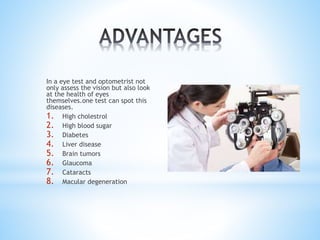Local Glaucoma Service Near Me: Relied On Specialists for Eye Wellness
Comprehending the Different Eye Issues Treated by Specialized Eye Treatment Professionals
In the world of eye care, specialized specialists play an essential role in detecting and treating a large range of eye problems. As we embark on this exploration of the various eye problems dealt with by specialized eye care experts, it comes to be apparent that the detailed internet of eye health and wellness holds a myriad of interesting understandings waiting to be revealed.
Typical Refractive Errors
Refractive errors prevail visual conditions triggered by an imperfection in the eye's ability to properly concentrate light, leading to obscured vision. The most common types of refractive errors consist of myopia (nearsightedness), hyperopia (farsightedness), astigmatism, and presbyopia. Nearsightedness takes place when the eyeball is as well lengthy or the cornea is also curved, triggering far-off things to show up fuzzy. Hyperopia, on the other hand, takes place when the eyeball is also brief or the cornea is also flat, resulting in close-by things running out focus. Astigmatism is identified by an irregularly designed cornea, causing altered or obscured vision in all distances. Presbyopia is an age-related condition where the lens loses its versatility, making it tough to focus on close items.
These refractive errors can be corrected with numerous methods, consisting of spectacles, get in touch with lenses, or refractive surgery. Eye care professionals play an essential role in identifying and taking care of refractive errors to help people achieve clearer vision and boost their quality of life.
Age-Related Eye Conditions
One of the most prevalent age-related eye conditions is age-related macular degeneration (AMD), a disease that triggers central vision loss and can make tasks like reading and driving challenging. Cataracts, one more common problem among older individuals, trigger clouding of the eye's natural lens, leading to obscured vision. Routine eye examinations with specialized eye care experts are essential for early discovery and monitoring of these age-related eye problems to maintain vision and preserve ocular health as individuals grow older.
Vision-Threatening Conditions
Vision-threatening illness include a variety of major eye conditions that have the prospective to dramatically affect a person's eyesight and overall visual feature. These diseases position a threat of irreversible vision loss otherwise immediately detected and treated by specialized eye care specialists. Some typical vision-threatening illness include glaucoma, diabetic retinopathy, age-related macular published here deterioration (AMD), and retinal detachment.
Glaucoma is a group of eye conditions that damage the optic nerve, often due to high intraocular stress, causing outer vision loss and potential loss of sight if left without treatment. Diabetic retinopathy is a complication of diabetes mellitus that affects blood vessels in the retina, causing vision disability or loss of sight. AMD is a progressive condition affecting the macula, causing main vision loss. Retinal detachment happens when the retina separates from its underlying cells, causing abrupt vision loss that needs prompt clinical attention (refractive surgeries in al).
Early detection, regular eye tests, and prompt treatment are essential in handling vision-threatening illness to preserve vision and keep quality of life. Specialized eye treatment professionals play a crucial role in diagnosing, dealing with, and handling these problems to stop irreversible vision loss.

Corneal Disorders
Corneal conditions include a spectrum of conditions that impact the transparent front part of the eye, understood as the cornea. Therapy for corneal disorders differs depending on the specific condition however might include medicines, contact lenses, or in severe situations, corneal transplants. Routine eye tests are necessary for very early detection and monitoring of corneal disorders to maintain vision Learn More and eye health.
Neurological Eye Conditions
Neurological eye conditions involve conditions that influence the link in between the eyes and the brain, affecting visual processing and general eye feature. These problems can show up in various means, influencing vision, eye motions, and also the sychronisation in between the eyes. One common neurological eye problem is optic neuritis, identified by inflammation of the optic nerve resulting in vision loss, color desaturation, and pain with eye motion.
An additional substantial condition is nystagmus, where the eyes make repetitive, uncontrolled movements, impacting visual skill and deepness understanding. Furthermore, problems like amblyopia, usually referred to as "careless eye," arise from abnormal aesthetic advancement in early youth, leading to reduced vision in one eye.
Neurological eye problems need customized treatment from professionals like neuro-ophthalmologists who have knowledge in both neurology and ophthalmology. Diagnosis frequently entails a comprehensive eye assessment, imaging studies, and cooperation with neurologists to attend to the underlying neurological issues influencing the visual system. Treatment strategies can consist of medication, vision therapy, or in severe cases, medical treatments to Learn More handle these complex conditions properly.

Final Thought
To conclude, specialized eye care professionals deal with a variety of eye problems, including typical refractive errors, age-related eye conditions, vision-threatening diseases, corneal disorders, and neurological eye problems - refractive surgeries in al. By understanding these various problems and seeking ideal therapy from eye treatment professionals, people can preserve optimum eye health and wellness and vision. It is necessary to focus on regular eye evaluations and comply with recommended treatment plans to protect and protect one's vision for the future